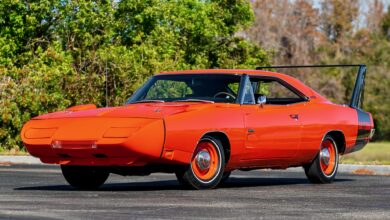THE MANUAL IS BACK: 6-Speed Returns To 2023 Dodge Challenger SRT HELLCAT!
Manual Transmission Returns To The 717-Horsepower Muscle Car...

Over the past decades, the automotive world has moved away from manual transmission offerings in favor of more fuel-efficient automatic transmissions. It has gotten to the point, that many of the newer drivers on the road have never driven a traditional stick-shift vehicle.

In late 2021, Dodge quietly “temporarily” suspended production of the Tremec TR-6060 6-speed manual transmission in the 717-horsepower Challenger SRT HELLCAT and SRT HELLCAT Widebody.
For those who prefer to shift gears in their supercharged muscle cars, the news was a big blow as news that the modern HEMI era of the muscle car was coming to an end. Especially since those who opt for a naturally-aspirated HEMI engine could still get the Tremec as the standard transmission choice in their car.

| Tremec TR-6060 6-Speed Manual Transmission – 22 MY Dodge Challenger | ||
| Variant | TREMEC TR-6060 WITH ZF-SACHS 240 MM TWIN DISC CLUTCH | TREMEC TR-6060 WITH ZF-SACHS 258 MM TWIN DISC CLUTCH |
| Availability | Standard — Challenger R/T and R/T Scat Pack & Widebody models | Standard — Challenger SRT HELLCAT, HELLCAT Widebody |
| Description | Triple cone/double cone synchronizer design, 1-4 skip shift and reverse inhibit solenoids, 5:1 remote shifter |
Triple cone (1st, 2nd) / double cone (3rd-6th) synchronizer design; 1-4 skip shift and Reverse inhibit solenoids; 5:1 remote shifter |
| Gear Ratio – | ||
| 1st | 2.97 | 2.26 |
| 2nd | 2.10 | 1.58 |
| 3rd | 1.46 | 1.19 |
| 4th | 1.00 | 1.00 |
| 5th | 0.74 | 0.77 |
| 6th | 0.50 | 0.63 |
| Reverse | 2.90 | 2.90 |
| Final Drive Ratio | 3.90 — asymmetric limited-slip, performance-tuned | 3.70 — asymmetric limited-slip, performance-tuned |
| Overall Top Gear | 2.33 | |
But for the 2023 “Last Call” model year, the Tremec is back in the Challenger SRT HELLCAT and HELLCAT Widebody lineup.

According to Dodge, since 2018, about 35% of SRT HELLCAT buyers have opted to purchase their car with the Tremec. I expected the number to be a lot lower honestly, but am happy to hear that are still those who enjoy the “true” driving experience.
Although the 6-speed is slower than the automatic car, doesn’t mean it’s SLOW! In fact, the manual HELLCAT can hit 0 to 60 mph (97 km/h) in about 4 seconds flat, depending on how fast you can shift. It also can run the 1/4-mile in 12.4 seconds @ 120 mph (193 km/h).

Currently, dealers are informing us that they are in fact, unable to order a manual transmission with the HELLCAT powertrain at the moment. However, Dodge has informed us that the option will be available as a late availability option for the HELLCAT. Keep in mind, that production for the 2023 model year will run until December 2023. There is no clear date of when, or how many 6-speed Challengers will be available.






1 reply
Loading new replies...
Join the full discussion at the Mopar Insiders Forum →